The Jaguar XK120 Roadster will never go out of fashion, though prices may wax and wane. This 1954 example, part of Gooding and Company’s Geared Online auctions October 26 to 30, has a history. It was delivered new in New York to Hoffman Motors, the company that had a lock on interesting imports in the 1950s. It then moved out to Ohio and competed in a variety of Cleveland Sports Car Club rallies and economy runs in the early 1960s.
This is a ragged-but-right barn find. It retains both its matching-numbers engine and its original colors, as confirmed by the Daimler Heritage Trust. It obviously hasn’t turned a wheel in a while, but would be a straightforward — if expensive — restoration. The odometer reads 64,186, and my guess is that’s accurate. Gooding estimates $25,000 to $40,000 for this car.
The XK120 looks straight and even looks fairly intact from 30 feet. Closer views reveal fairly dire paint, with abstract patterns of cracking and flaking. It was actually hard to tell if the car is cream-colored or just white and barn-find dirty–but it’s officially Ivory. The Jag might look fairly decent cleaned up, and (aside from the wire wheels) there’s no visible body rust—a major advantage with decay-prone XK120s. All the little details are still on board, and the tastefully applied chrome isn’t at all bad.
The undercarriage is a symphony of surface rust (with some rust-through), oil leaks, perished bushings, and plenty of work beckoning. The black interior is simple, and on the dividing line between treasured patina and just plain weathered. I’ve seen much worse. If there’s a top and frame included, it’s not visible. The coupes had much more opulent fittings, making them more expensive to restore.
Let’s not belabor the history of this model, because it’s a much-told tale. The (originally) 3.4-liter XK dual-overhead-cam six was developed for the big Mark VII sedan by William Heynes. But then, almost as an afterthought, they said, “Hey, why don’t we also fit it to a new sports car?” The thought, in 1948, was that a few hundred cars would get some much-needed publicity and help with the important export market. But then it was a big hit—a sensation—when it hit the show circuit.
The first XK120s, so named because one hit 120 mph in Belgium, were aluminum-bodied, and those are quite rare and valuable. The closed version didn’t appear until 1951, and the drophead coupe (with roll-up windows) in 1953. Sixty percent of the XK120s came to the U.S., and 12,000 were produced in a seven-year run that ended with the XK140 in 1955.
I love this fact: An XK120 driven by Al Keller won a NASCAR race at Linden Airport in 1954, making him “the first and only driver in the history of NASCAR’s premier series to win a race in a foreign-made car.” So the question is, are you ready to bid? The winner of this auction will have likely to have several years of hard work ahead, but the results could be quite rewarding. It’s nice to see good-quality photos. They were taken by Mike Maez for Gooding.

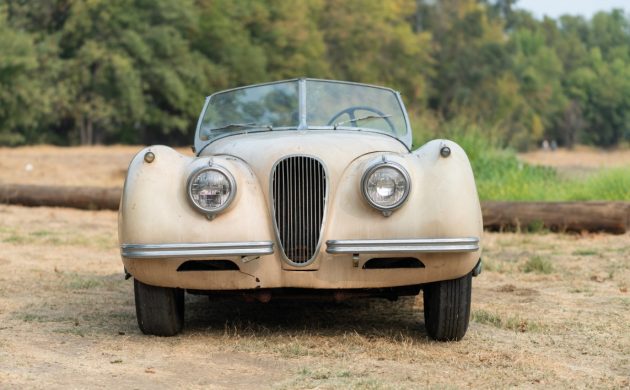
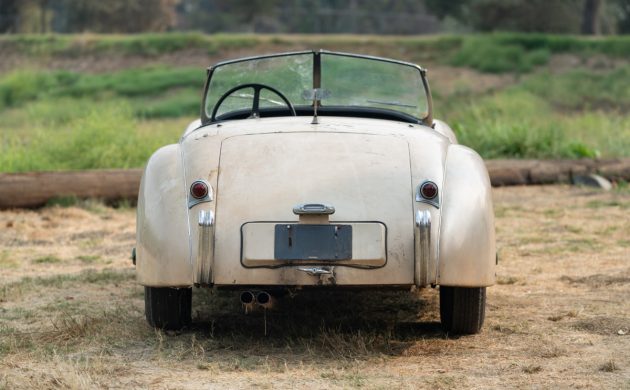
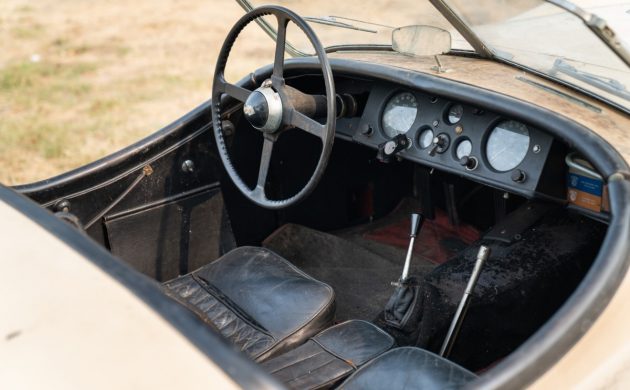
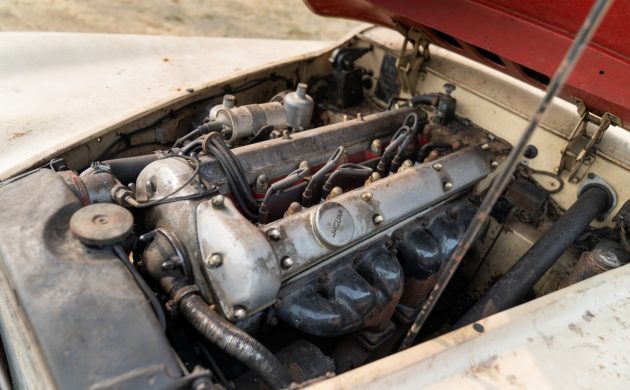
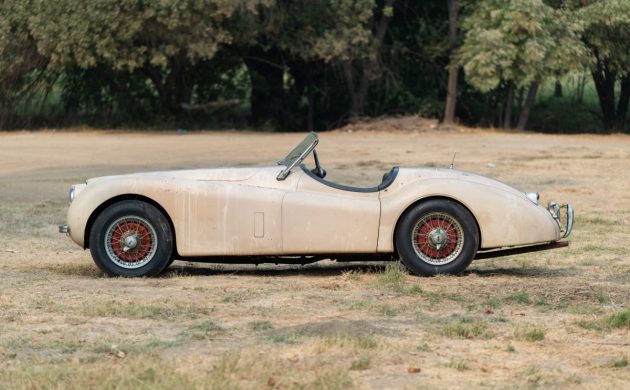
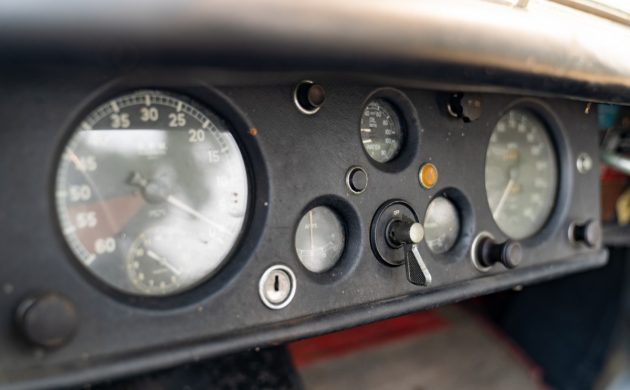





Wow…..glad it survived relatively intact.
Only original once….make it safe to drive,clean it up and drive it.Why restore her??
The dash instruments look clean; a promising sign that this one didn’t spend time exposed for years uncovered and left to rot.
Not cheap to restore, this one looks very promising. At $25K, this would make a good multyear project for someone, and end up having a very valuable car, if restored correctly and accurately. Plus a great fun factor besides.
One slight correction on the history: While conceived as the engine to power post war saloons, the Mark VII saloon was a new design and ran into delays. So it was not going to be ready for the October 1948 Earls Court auto exhibition which was attended by hundreds of thousands of people from around Europe. So the XK120 open two seat sports car was designed and built out of desperation to show off yhe new DOHC XK engine, in about 8 weeks, taking many chassis parts from the Mark V saloon. Sir Walter Lyons thought the total market would be 200 sports cars, far to few to support new tooling. So 200 car bodies were hand made on bucks using an aluminum alloy.
The XK120 was the hit of the Earls Court show and sales literally exploded. As a result, tooling was made and subsequent cars like this one were primarily bodied in steel except for the bonnet.Those first 200 cars are today referred to as “alloys” and fully restored to concours condition fetch $300K – $400K, or roughly 3X the price of a concours steel body XK120.
Nice! Like to see it in my garage!
Mike Maez is a great guy and, obviously, talented photographer. When I sold a car through Gooding they flew him out and we spent a rather warm day moving the car around to get a hundred or shots that I would call perfect. Very patient and talented.
Just wait until that cold rainy night and the Jag stops (again) and you’ve got to reach the points on that distributor hidden way down low and your back is already aching from having to safely push it to the side of the road and now your feet are sinking into the mud and the freezing water is running both into your eyes and down your back! Such is the Jaguar experience. And then there’s the SU fuel pumps . . .
Sounds like any number of old cars…
Yeah, but Jaguars were like this from new.
I owned and drove a 120 in the mid-sixties. No problem with the points, it was keeping the damn carbs adjusted that frustrated me.
I saw a beautifully restored 120 last week at Cruisin’ the Coast. The engine is a work of art!